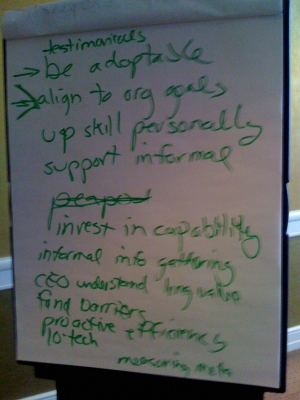Harold Jarche and Jay Cross have been talking about rethinking the training department, and I have to agree. In principle, if there is a ‘training‘ department, it needs to be coupled with a ‘performance‘ department and a ‘social learning‘ department, all under an organizational learning & performance umbrella.
What‘s wrong with a training department? Several things you‘ll probably recognize: all problems have one answer – ‘a course‘; no relationships to the groups providing the myriad of portals, no relationship to anyone doing any sort of social learning, no ‘big picture‘ comprehension of the organization‘s needs, and typically the courses aren‘t that great either!
To put it another way, it‘s not working for the organizational constituencies. The novices aren‘t being served because the courses are too focused on knowledge and not skills, aren‘t sufficiently motivating to engage them, and use courses even when job aids would do. The practitioners are not getting or able to find the information they need, and have trouble getting access to expert knowledge. And experts aren‘t able to collaborate with each other, and to work effectively with practitioners to solve problems. Epic fail, as they say. OK, so that‘s a ‘straw man‘, but I‘ll suggest that it‘s all too frequent.
The goal is a team serving the entire learnscape: looking at it holistically, matching needs to tools, nurturing communities, leveraging content overlap, and creating a performance-focused ecosystem. I‘ve argued before that such an approach is really the only sustainable way to support an organization. However, that‘s typically not what we see.
Instead, we tend to see different training groups making courses in their silos, with no links between their content (despite the natural relationships), often no link to content in portals, no systematic support for collaboration, and overall no focus on long-term development of individuals and capabilities.
So, how do we get there from here? That‘s not an easy answer, because (and this isn‘t just consultant-speak) it depends on where the particular organization is at, and what makes sense as a particular end version, and what metrics are meaningful to the organization. There are systematic ways to assess an organization (Jay, Harold, and I‘ve drafted just such an instrument), and processes to follow to come up with recommendations for what you do tomorrow, next month, and next year.
The goal should be a plan, a strategy, to move towards the goal. The path differs, as the starting points are organization-specific. One way to do it is DIY, if you‘ve got the time; it‘s cheaper, but more error-prone. The fast track is to bring in assistance and take advantage of a high-value, lightweight infusion of the best thinking to set the course. No points for guessing my recommendation. But with the economic crisis and organizational ‘efficiencies‘, can you afford to stick to the old ineffective path?

